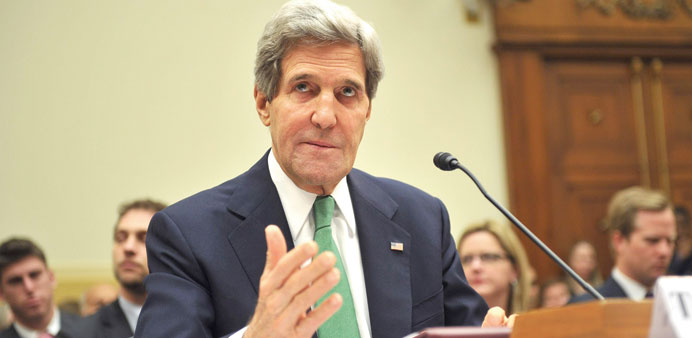AFP/Washington
Secretary of State John Kerry yesterday raised doubts if Iran was truly prepared to conclude a final deal with Western powers on dismantling its nuclear programme, but urged US lawmakers not to impose new sanctions.
“I came away from our preliminary negotiations with serious questions about whether or not they’re ready and willing to make some of the choices that have to be made,” Kerry told US lawmakers.
“Has Iran changed its nuclear calculus? I honestly don’t think we can say for sure yet. And we certainly don’t take words at face value,” Kerry told the House foreign affairs committee.
The top US diplomat, who helped hammer out an interim six-month deal with the Islamic Republic to freeze parts of its suspect nuclear programme, said “believe me this is not about trust.”
“Given the history we are all rightly sceptical about whether people are ready to make the hard choices to live up to this.”
But he stressed Iran’s seriousness would be put to the test over the six months set out in the November 24 interim deal hammered out last month in Geneva.
Iran has denied accusations it is seeking to acquire a nuclear weapon under the guise of its civilian atomic energy programme.
Kerry said “we now have the best chance we’ve ever had to test this proposition without losing anything” and he urged lawmakers to hold off imposing new sanctions on Tehran to give negotiators time to work.
“I’m not saying never ... If this doesn’t work we’re coming back and asking you for more. I’m just saying not right now.”
Two US senators—Democrat Robert Menendez and Republican Mark Kirk, are finalising a new Iran sanctions measure that they hope to introduce before Congress goes on its year-end recess.
Senator John McCain, who said he hoped senators could “get an agreement in the next day or two”, dismissed the idea that introducing new sanctions legislation now would hurt the interim agreement.
“It’s supposed to be a six-month deal,” he said of the legislation, which would aim to punish Iran if it reneged on its part of the deal that it reached with members of the so-called P5+1 group of global powers.
Fellow Republican Senator Lindsey Graham said the new sanctions would not take effect until after the six months, and would “basically tie to the UN resolutions”.
Kerry said the world faced a crossroads, “a hinge point in history”: one path could lead to a resolution of global concerns about Iran’s nuclear programme, the other could lead to conflict.
And he warned that if the US went ahead with new sanctions, it risked angering Washington’s P5+1 partners and could also give Iran an excuse to flout the deal.
Experts were meeting yesterday in Vienna in a bid to nail down a start date for the Geneva deal, which would set the clocking ticking on the six-month deadline for a deal.

Kerry testifies before the House foreign affairs committee yesterday.
